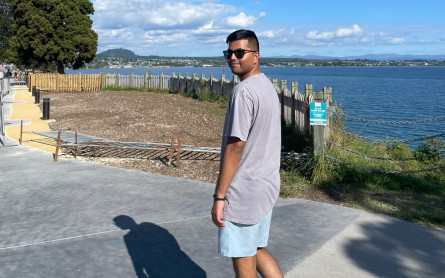
Planning & budgeting
Saving & investing
KiwiSaver
Tackling debt
Protecting wealth
Retirement
Home buying
Life events
Setting goals
Money tracking
Plan your spending with a budget
Getting advice
Studying
Get better with money
What pūtea beliefs do you have?
How to build up your emergency savings to cover unexpected costs
How to save your money
How to start investing
Find a financial adviser to help you invest
Your investment profile
Compound interest
Net worth
Types of investments
Term deposits
Bonds
Investment funds
Shares
Property investment
How KiwiSaver works and why it's worth joining
How to pick the right KiwiSaver fund
Make the most of KiwiSaver and grow your balance
How KiwiSaver can help you get into your first home
Applying for a KiwiSaver hardship withdrawal
How to use buy now pay later
What you really need to know before you use credit
How to get out of debt quickly
Credit reports
Know your rights
Pros and cons of debt consolidation
Credit cards
Car loans
Personal loans
Hire purchase
Student loans
Getting a fine
What happens if I start to struggle with moni?
How to build up your emergency savings to cover unexpected costs
Cryptocurrency
How to protect yourself from fraud and being scammed
About insurance
Insurance types
Insuring ourselves
Wills
Enduring powers of attorney
Family trusts
Insuring our homes
Losing a partner
Redundancy
Serious diagnosis
How to cope with the aftermath of fraud
Separation
About NZ Super – how much is it?
When you’re thinking of living in a retirement village
How to plan, save and invest for retirement
Manage your money in retirement
Find housing options in retirement
Four approaches to spending in retirement
Planning & budgeting
Saving & investing
How to build up your emergency savings to cover unexpected costs
How to save your money
How to start investing
Find a financial adviser to help you invest
Your investment profile
Compound interest
Net worth
Types of investments
Term deposits
Bonds
Investment funds
Shares
Property investment
View all
KiwiSaver
Tackling debt
How to use buy now pay later
What you really need to know before you use credit
How to get out of debt quickly
Credit reports
Know your rights
Pros and cons of debt consolidation
Credit cards
Car loans
Personal loans
Hire purchase
Student loans
Getting a fine
What happens if I start to struggle with moni?
View all
Protecting wealth
How to build up your emergency savings to cover unexpected costs
Cryptocurrency
How to protect yourself from fraud and being scammed
About insurance
Insurance types
Insuring ourselves
Wills
Enduring powers of attorney
Family trusts
Insuring our homes
Losing a partner
Redundancy
Serious diagnosis
How to cope with the aftermath of fraud
Separation
View all
Retirement
Home buying

A bit about Gordon: University student Gordon lives in Tāmaki Makaurau Auckland and works part-time at a major bank. Outside of that, you’ll find him hanging out with his partner, on the football field, or binge-watching whatever’s on TV.
To make my money work for me. It’s one thing to work for money, but it’s another thing to put that money to work to satisfy immediate needs and wants and provide yourself with some versatility when it comes to navigating the future.
I like to think I’ve struck a healthy balance between the two, saving and investing as much as I can, while allocating every other dollar to funding the life I want to live. Planning for the future is important, but it’s no use if we don’t stop from time to time to enjoy what we’ve achieved.

“It’s one thing to work for money, but it’s another thing to put that money to work.”
Parkinson’s Law – the idea that work expands to fill the time we’ve allocated for it. I’ve discovered that the same thinking applies to the way we manage our money. For example, if we give ourselves $100 to spend, we’ll find a way to spend it all. In the same way, if we adjust that amount, somehow our subconscious will adjust our spending too. There’s the old cliché “less is more”. With a slight change in perspective, I’ve found myself able to do a lot more with even just a little.
Knowing that every dollar I earn is serving an important purpose in the overall picture, while at the same time taking comfort in the fact that I have funds to fall back on. Ultimately, money either adds to our stress or helps remove it. If I feel like I know what I’m doing and that I’m prepared for the unforeseen, that’s better than having no plan and preparing myself for failure.
There are three beliefs that I’ve caught onto from others:

“With a slight change in perspective, I’ve found myself able to do a lot more with even just a little.”
It’d tell me to relax and not sweat the small stuff. Over the next year, I’ll move from studying into full-time work. I’ve looked after my financial wellbeing and can find comfort in the fact that I’ve set myself up for success. For now, I need to think a little less about money, and more about what’s in front of me.
As part of my transition to working full-time, I’ll graduate with my second university degree. I’m proud to share that I’ve achieved both my degrees without a student loan. All throughout, I’ve worked part-time and saved enough on the side to get me through, and it’s made the journey all the more satisfying.
I’m very much a city-dweller and like to stay busy, so I don’t think I could handle moving to the country, but I want to know that I can escape whenever I like, and I enjoy switching off and relaxing with my partner. I’ll read this again when I’m 65 and see how much of a busy person I still am!
If you’d like to join the conversation and share your own experiences with money, we’d love to hear from you. Fill in this form, and we’ll get back to you. Ngā mihi!
Use verification code from your authenticator app. How to use authenticator apps.
Code is invalid. Please try again
Don't have an account? Sign up
Or log in with our social media platforms


A free account gives you your very own space where you can save your tools and track your progress as you get ahead.
Or sign up using Google:



Comments (1)
Comments
Emily | 17 July 24
Great stuff, Gordon. Well said
No one has commented on this page yet.
RSS feed for comments on this page | RSS feed for all comments